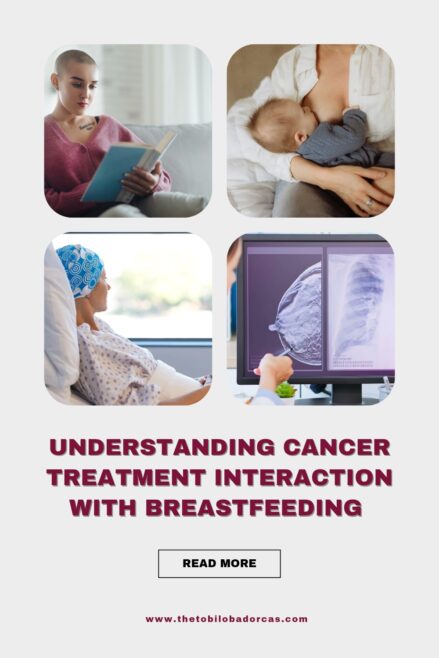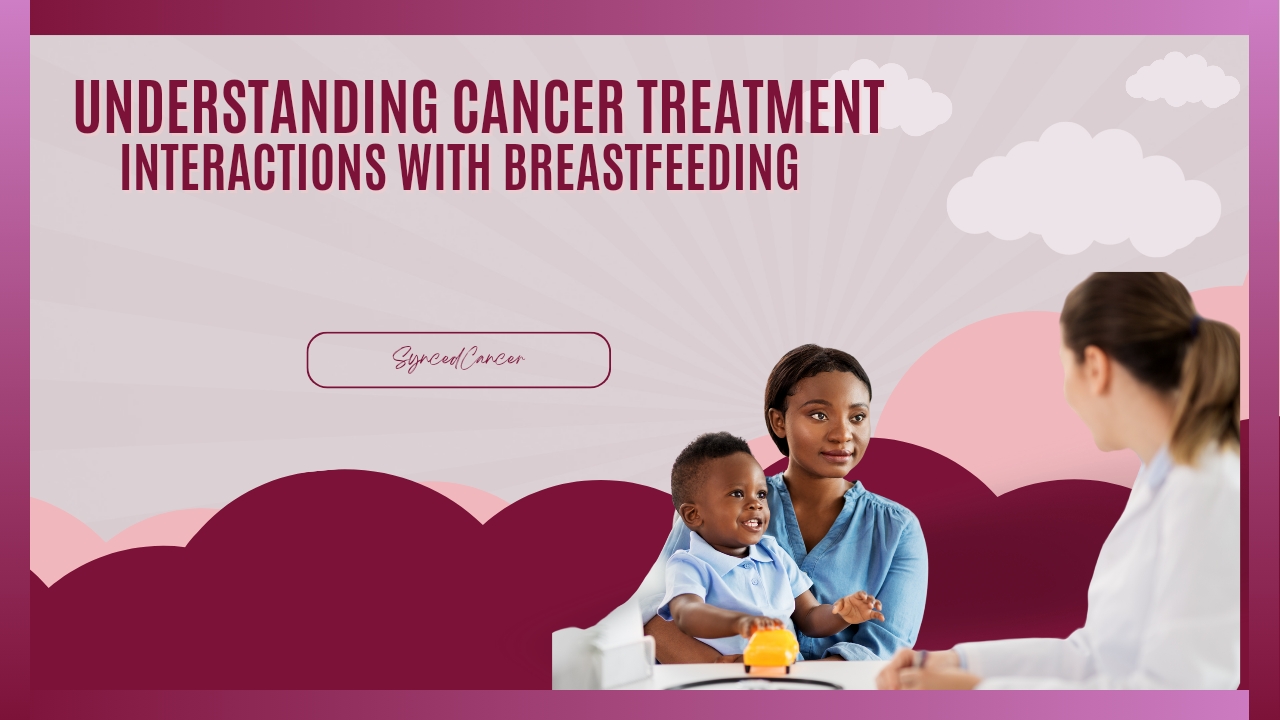Breastfeeding is widely acknowledged as a critical component of infant nutrition, providing numerous health benefits for both mother and baby. However, when a mother is diagnosed with cancer, concerns arise about the compatibility of cancer treatments with breastfeeding. This blog post aims to explore the complexities of cancer treatment interactions with breastfeeding, emphasizing the importance of informed decision-making and individualized care.
IMPACT OF DIFFERENT CANCER TREATMENTS ON BREAST MILK SAFETY
Various cancer treatments, including chemotherapy, radiation therapy, and targeted therapy, can impact breast milk safety differently. Understanding these impacts and discussing the risks and benefits with doctors are crucial for informed decision-making.
- Surgical intervention is often the primary treatment for localized cancers. While surgery itself does not directly affect breast milk, certain procedures may impact breastfeeding:
- Mastectomy: Removal of one or both breasts eliminate the ability to breastfeed on the affected side(s).
- Lumpectomy: Breast-conserving surgery may preserve breastfeeding function, but there may be a temporary reduction in milk supply due to tissue trauma.
- Lymph node removal: Surgery involving lymph nodes can disrupt lymphatic drainage, leading to lymphedema and affecting milk production.
- Chemotherapy is a common cancer treatment that utilizes drugs to kill cancer cells. While chemotherapy drugs can enter breast milk, their impact on infant health varies:
- Drug compatibility: While chemotherapy drugs vary in their ability to transfer into breast milk, many are considered unsafe for breastfeeding due to potential harm to the infant.
- Transfer into breast milk: Factors such as drug molecular weight, lipid solubility, and protein binding influence the extent of drug transfer into breast milk.
- Risks to the infant: Chemotherapy drugs that are highly toxic or have a long half-life in the body are more likely to transfer into breast milk and pose risks to the baby’s health. Chemotherapy drugs in breast milk can affect the infant’s immune system, gastrointestinal tract, and potential long-term developmental effects.
- Radiation therapy, another cornerstone of cancer treatment, utilizes high-energy radiation to destroy cancer cells. Its impact on breastfeeding depends on the location and extent of radiation. Its impact on breast milk safety depends on several factors:
- Breast radiation: Radiation to the breast may affect breast tissue and reduce milk production, leading to concerns about the adequacy of infant nutrition. The safety of breastfeeding during and after radiation depends on the dose and area irradiated.
- Shielding techniques: Advanced radiation techniques can minimize exposure to healthy breast tissue, allowing for safer breastfeeding.
- Timing of radiation: Delaying radiation until after breastfeeding goals are met may be an option for some women.
- Targeted therapy, a newer approach to cancer treatment, involves drugs that specifically target molecular pathways involved in cancer growth and progression. While targeted therapies are often considered safer than traditional chemotherapy, their impact on breastfeeding is not yet fully understood:
- Limited data: Limited studies exist on the transfer of targeted therapy drugs into breast milk and their effects on the infant.
- Individual drug considerations: Each targeted therapy drug may have unique properties that affect its compatibility with breastfeeding.
- Risk assessment: While targeted therapy is generally considered safer than chemotherapy, its impact on breast milk safety requires careful evaluation.

IMPORTANCE OF OPEN COMMUNICATION WITH DOCTORS
Discussing the risks and benefits of breastfeeding during cancer treatment with doctors is essential. They help assess the urgency of treatment, the stage and aggressiveness of the cancer, and the mother’s individual circumstances and preferences.
In cases where breastfeeding is deemed unsafe during treatment, doctors can explore alternative feeding options, such as temporarily weaning the infant and maintaining milk supply through pumping and storing breast milk for later use, formula feeding or donor milk. While these options may not replicate the benefits of breastfeeding, they ensure that the infant’s nutritional needs are met while minimizing potential risks.
Doctors can provide valuable information about the specific drugs or therapies involved in treatment and their potential impact on breast milk safety, along sides other importance.
- Informed Decision-Making
- Understanding Risks and Benefits: Open communication with healthcare providers allows mothers to fully understand the risks and benefits of different treatment options. This comprehensive understanding helps in making informed decisions that align with personal and family priorities.
- Tailored Treatment Plans: Doctors can help tailor treatment plans that consider both the mother’s health and her breastfeeding goals. This might include adjusting treatment schedules or exploring less toxic alternatives.
- Managing Expectations
- Realistic Outcomes: Clear communication helps set realistic expectations about the potential impacts of cancer treatment on breastfeeding. This includes understanding potential challenges and developing practical solutions to manage them.
- Contingency Planning: Discussing various scenarios and outcomes prepares mothers for potential changes in their ability to breastfeed, ensuring they are not caught off guard and have contingency plans in place.
- Emotional Support
- Psychological Well-Being: The emotional toll of a cancer diagnosis and the potential disruption of breastfeeding can be significant. Open dialogue with healthcare providers can provide much-needed emotional support and resources to help manage stress and anxiety.
- Counseling and Support Groups: Doctors can refer mothers to counseling services and support groups specifically for cancer patients and breastfeeding mothers, providing additional layers of support.
- Coordinated Care
- Interdisciplinary Collaboration: Cancer treatment often involves multiple healthcare professionals, including oncologists, surgeons, lactation consultants, and pediatricians. Open communication ensures that all members of the healthcare team are aligned and working towards the best outcomes for both mother and child.
- Holistic Approach: A coordinated approach that considers the mother’s physical, emotional, and breastfeeding needs leads to more holistic and effective care.
- Long-Term Follow-Up
- Monitoring Health: Regular follow-up appointments allow healthcare providers to monitor the mother’s health and the safety of breastfeeding over time. This ongoing dialogue ensures that any new issues are promptly addressed.
- Adjusting Plans: As treatment progresses, it may be necessary to adjust plans based on the mother’s response to treatment and her breastfeeding goals. Continuous communication facilitates these adjustments.
Conclusion
It’s important to recognize that the decision to breastfeed during cancer treatment is highly individualized and depends on multiple factors. Mothers must weigh the benefits of breastfeeding, such as bonding with the infant and providing optimal nutrition, against the potential risks to the infant’s health.
Moreover, the emotional impact of interrupting breastfeeding cannot be overlooked. Breastfeeding is not only a nutritional but also an emotional bond between mother and baby. The prospect of discontinuing breastfeeding due to cancer treatment can be distressing for mothers. It is essential for healthcare providers to provide comprehensive information and support to mothers, empowering them to make informed decisions that prioritize both their own health and the well-being of their infants. Through individualized care and support, mothers can navigate the challenges of cancer treatment while maintaining their bond with their infants through breastfeeding.
REFERENCES
Medical News Today – https://www.medicalnewstoday.com/articles/322004
Assessed 6th May, 2024



What do you think?
It is nice to know your opinion. Leave a comment.